Donald MacLean's Blog 11
BROADCASTING 1
A group of us old fogeys is being shown round our erstwhile workplace.
London's 'Broadcasting House' is being modernised.
In 1929 "BH" cost £500,000 to build.
This renovation is costing £400,000,000.
Only the front is familiar.
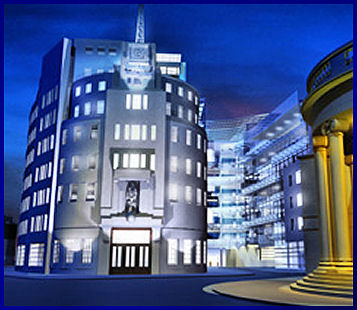 |
"... and these buttons call-up sound-effects - digital, of course."
Memories are flooding back.
"Dear BBC Glasgow, I'm 17, just got my 'highers' and have enrolled in the Scottish Academy of Music as a clarinet student. My other hobby is wireless. Can I work for you when the war is over and I've done my National Service?"
"Dear Donald, Maybe ... just fill in this application."
Days later my father says "By the way, I saw Melville Dinwiddie today .. he's Head of the BBC in Scotland .. and he said .. " I explode with anger .. "Look, Dad, I know you mean well .. but I'm not a child now .. I want to get my first job MYSELF!"
Poor Dad. He'd got his first jobs himself ... and had learned more than I'd ever know about employment and unemployment.
"Of course, son ... I was just going to say that Melville promised me he would not mention you to anyone unless/until you have passed the normal selection procedures."
"Dear Donald, It is my pleasure to advise you that following the tests and interviews you have been accepted as a 'Youth in Training' in our 'Programme Engineering' Department at a salary of 21 shillings a week plus 7 shillings & sixpence 'cost-of-living bonus'. It is requested that you arrange to attend the College of Music part-time so that you can begin your apprenticeship here before going into the services."
"And this is our sound-effects suite ... you'll be spending lots of time here." The old-hand is introducing me to my new workplace. "If a script calls for the sound of a car engine you'll play a disc of it on one of this row of turntables. For footsteps - see this circular arrangement on the floor, the microphone hanging over its centre ... you walk round the outer circle - it's concrete - or the inner circle of floorboards - here are the special creaky ones ... the centre section is gravel. The coconut-shells are for horses' hooves. The big sheet of metal makes a thunderclap. This water-tank has a rowlock and an oar. All these physical sounds are called "spot effects".
The first big production to which I am assigned is Jimmy Crampsey's epic production of "Sunset Song" by Lewis Grassic Gibbon. My colleagues Iain MacFadyen and Jimmy Bulloch and I share the very testing sequences of spot and gram effects.
 |
Down on the ground floor is the nerve-centre of
big productions - the 'operating theatre' of more senior Programme Engineers.
It's a room with a long
Control Desk - rows of fist-sized knobs, one for each studio - to 'fade in' a studio
the knob is turned clockwise. The overall 'level' is adjusted so that the loudness is between 4 and 6 on a meter.
As a studio is faded-in a key
is depressed which lights green 'cue' lights on each wall of that
studio. (In the studio the actors know to look for it because their
loudspeaker goes silent as the knob is turned).
(It was at this desk that I later directed the "Adventures of Richard Hannay" series.)
When actors are supposed to be in a large room or hall part of the sound will be diverted through a stone-walled basement room containing only a loudspeaker and one microphone - an 'echo room'. When they're supposed to be outdoors the actors cross the corridor to a 'dead' studio - padded walls - an uncomfortable place.
Scottish Home Service included programmes in the Gaelic language (spoken of as 'the Gallic'). Sometimes they were pre-recorded ... reproducing those recordings was the 'Prog. Eng.' task which scared me most. Recorded programmes were engraved into the lacquer coating of a series of large metal discs - with overlaps (about 10 seconds at the end of one disc being also at the start of the next one) so that you could switch from one to the next during a pause between sentences. (Of which there is none nowadays ... punctuation, on radio, like controlling the volume, seems to have become a relic of the past!).
Not 'having the Gaelic' I used to mark the recurring word for "and" in the script - and move from one "agus" to the next. Not a foolproof method, of course - one still had to recognise the sounds that preceded and followed the changeover point. I was once accused by my colleagues of having played the eight discs of a Gaelic discussion in reverse order! They were joking. I think.
"Jump cuts" were the stuff of nightmares. Ambitious Producers could decide to cut a section of speech in the middle of a disc. Think about that ... you have to mark the 'out' and the 'restart' grooves with a wax pencil ("dermatograph" it was called - and sharpened to a chisel shape ... odd how these details come readily to mind, when I genuinely can't remember what Ann asked me to do 5 minutes ago!) With your fingers already trembling with nerves you daren't think about how popping it down into the wrong groove will sound in a million ears! How much easier 'jump cuts' became with tape and razor-blades. In this new Broadcasting House no doubt it's a button-pushing, digital task.
There was a programme of Bagpipe music every Friday evening - this was the first programme I was given to do on my own. Bagpipes were designed to inspire troops in battle - ie outdoors - so they are broadcast from one of the 'dead' studios. This Piper is tall and serious - so I'm surprised, on entering the studio, to find the air suffused with the scent of whisky. My first performer explained: "The bag of the pipes is preserved by feeding it regularly a wee drop of 'the cratur'".
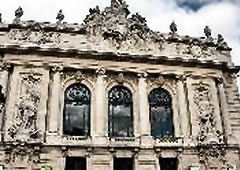 |
9 years later, Coronation Day in 1953 is marked by some spectacular 'outside broadcasts'. I am now a Producer based in London and am on my way to France to cover a celebration in the majestic Opera House of Lille - as an example of how ex-pat Britons are celebrating around the world. As I board the boat-train in London the Ticket Collector says he has been directed to take me to a private compartment ... and there, in an opulent sitting-room, is the bandleader Geraldo, whose orchestra is to play for dancing in my programme. Gerry says "You heard the news? Edmund Hillary has done it - the first man to reach the summit of Everest!"
The reason I'm telling you this is that the climax of that evening's concert was to be a pipe band - that year's World Champions - the band of the Glasgow Police Force, led by my friend and namesake Pipe-Major Donald MacLean. I arranged that the stage curtains would close, the lights would dim, the sound of the pipes would be heard distantly (this was a deeply emotional sound for all of us - evoking recent battles and bravery) - and the curtains would open slowly to reveal the magnificent spectacle of these men in their tartan finery, whose music would overwhelm the audience.
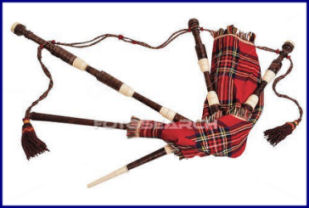 |
Initially all went to plan. As I'd hoped, the distant skirl of the pipes
brought the huge audience to its feet, crowding towards the stage. And
as the heavy curtain slowly rose they were indeed overwhelmed - not just by
the music but by a tidal wave of whisky fumes ... so powerful that laughing
men and women were seen to be stumbling backwards to escape the tsunami!
 |
(Did you know that the insignia of a Pipe-Major is a group of inverted chevrons? Well ... the insignia of a German General was also ... yes ... a group of inverted chevrons. I heard that Pipe-Major Donald Maclean had been captured early in the war and his captors, thinking him a General, created a special Prison Camp for the most senior captured officers and put Donald in charge of it. I'm told that he proved to be an effective commandant, quietly helping his very senior protégés with their escape-planning).
Where was I?
Ah yes - whisky preserves the bags of bagpipes. You do believe that, don't you?
Neither do I.
"Queen Margaret Drive" (where I worked),
whose architect was the renowned Charles Rennie Mackintosh,
is to be
converted into the luxury "Hamilton
Hotel" - to open in 2011.
BBC Glasgow has moved to a new, purpose-built, home, by the river.
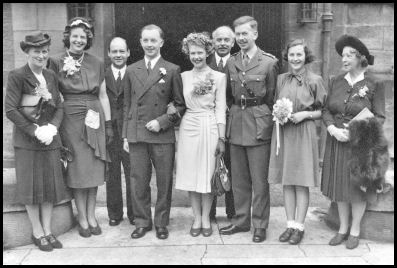 |
In QM Drive, in 1947, one of my fellow Programme Engineers was Margaret Thorburn, seven years my senior, a graduate of the Royal College of Music in London and an exceptional pianist. We became friends. We became husband and wife.
1947
My Mother - Bridesmaid - Mgt's Brother
Me (& my 'demob' suit) - Margaret
My Father - Brother - Sister - Mgt's Mother
(Mgt's Father had died.)
7 years later, in London, Margaret and I became parents. Our son has many of her characteristics - music in every pore - quiet, shy - avoiding the limelight - choosing, like his late mother, the very demanding role of accompanist and teacher. Approaching the age of fifty Colin quit a high-pay/high-stress job in the computer industry to teach the guitar contentedly (including in a college where his mother had taught) and to be accompanist to a very talented young songwriter/singer (www.mm-music.co.uk)
The world of broadcasting was where Margaret and I met and it remained our shared world until her untimely death three and a half decades later.
It seems that few of my friends have been fortunate in enjoying a devoted partnership for all their adult lives. I have been especially lucky to have two - Margaret for 34 years and Ann for - already! - almost 27. I must be very very old!
Some of my friends enjoyed their National Service. I didn't. I accepted that the war was necessary but army life was just too full of frustrations. In volunteering for the new technical corps I had not known that lacking a science degree precluded my seeking a commission. So I took pride in becoming a "Sergeant-Highly-Skilled" teaching bright youngsters complex skills.
But. No matter how challenging a soldier's main task it was decreed that he also had to defend himself. And therein lay a problem. Teaching my students to think constructively was difficult when they'd spent the morning learning to react, unthinking, to shouted commands - like circus animals. A number of solutions are, of course, obvious. I tried to suggest them to an experienced Colonel - and got short shrift - "no use a lad being hot stuff with an AVO-meter if he gets a bullet up his arse." So I spent a couple of years helping create half-soldier/half-technicians.
Post-war ... I was finally 'demobbed' in 1947 ... I returned to the BBC in Scotland and was posted to their studios in Aberdeen (as the sole Programme Engineer there). An early assignment was an 'outside broadcast' from a tiny church in the remote North. This series of Sunday morning programmes had developed a few trade-marks, including the pealing of the church bells behind the opening announcement. The sound of them was usually picked-up by one of the microphones inside the building.
I thought I would emphasise the remoteness of this location by relaying the sound of the (single) bell echoing across the desolate valley, so I used the longest cable I had and lodged the microphone in a stone wall high on the heather-clad hillside. With less than a minute to transmission I checked that the mic was still there in the distance - and to my horror saw it surrounded by a group of sheep, clearly hoping this intruder was edible. The 'continuity' announcer in London urged two million listeners to savour the lonely sound of the wee kirk's bell ... and it was just audible among the double-forte grunts and fore-and-aft sound-effects of ovine digestion.
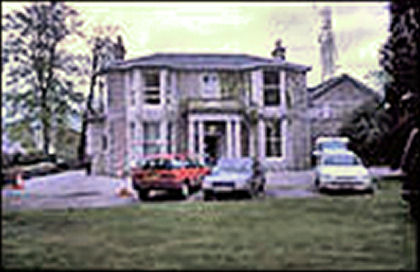 |
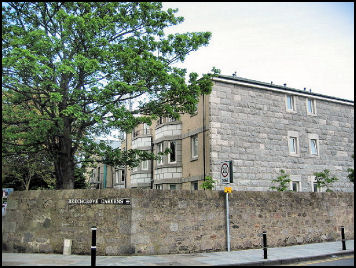 |
|
BBC Aberdeen 1923-2000 |
A block of flats now |
After a year as "Prog. Eng, Aberdeen" I competed for the role of 'Junior Producer' in Glasgow and got it - at 22 the BBC's youngest producer.
One year during my spell in Glasgow we covered a number of artistic events in Edinburgh - the first of what was to become an annual Festival of world status. There was also the 200th edition of "Workers Playtime" in which I met the legendary Vera Lynn. Many years later, as we sat in her house in London's Regent's Park, her husband Harry reminded me of this. Years later still, their daughter Virginia joined the small team of my radio-jingles company in EMI. She and Ann became friends and spent weekends as guests of Vera and Harry at their home near the South Coast. When Ginny left the team she asked if she might have two of the photographs which hung on Ann's office wall - big prints of black-&-white photos with which I'd won prizes in a national competition. One was of a very wise-looking owl looking down his beak at the world and the other of someone's cat. "The Owl and the Pussycat" said the imaginative Ginny ... something that, I confess, had not occurred to me.
One of Britain's first radio "Soap Operas" had started in Scotland in 1939 and by the time I became a producer in Glasgow it was hugely successful. Archie P.Lee, after 10 years of producing every Saturday evening episode (no pre-recording), wanted a change and I was asked to take it on. It was set in a typical Glasgow downmarket 'tenement' and the characters spoke a broad Glaswegian dialect. Each character was named after a fabric! Molly Weir played "Ivy McTweed" and Rikki Fulton was the Rev David McCrepe. The series was the creation of the formidable Helen W. Pryde and was called "The McFlannels". It migrated to TV after I migrated to London in 1953.
If you play YouTube's samples of The McFlannels you will immediately sense Rab Nesbitt's roots!
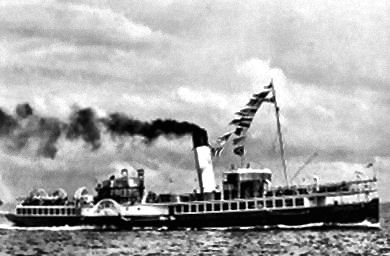 |
One of the best radio-writers I've ever come across was called Edward Boyd. He wrote an altogether more intelligent, more astringent drama in Glasgow-dialect called "Doon the Watter" (the annual paddle-steamer excursion down the Clyde to Rothesay). I produced it and a follow-up ... and have regretted ever since being unable to further the career of that brilliant creative mind. His wife Kate was a talented artist. Like several others of our friends, Eddie & Kate seemed happiest when living apart (and behaving like sinful lovers). Occasionally I look wistfully at a simple line drawing (a female nude) which Kate gave me after I'd recognised it as her work in a magazine called "Men Only". It was Eddie and Kate who heard that Margaret and I were trying to find a flat to rent in London and gave us the address that became our home in Hampstead when Colin was born in 1954.
I brought Rikki Fulton to London to present "The Joe Loss Show" and he became as popular throughout the UK as he already was in Scotland. When Margaret and the baby came home from the maternity ward it was Joe Loss's very kind wife Mildred who arrived at our "garden flat" (ie basement) with the most upmarket of prams for him. We couldn't afford anything as expensive and I worried (after the bribery scandals that had preceded the current regime at Aeolian Hall) that anyone would discover the source of this luxury. (Later, when I was responsible for the BBC's popular music output I repeatedly returned, with thanks, cases of wine or Scotch, until this message was generally accepted.)
Two other of my Glasgow programmes come to mind from that period: In "The Guid Scots Tongue" each broadcast dealt with a different regional dialect. It was scheduled to be a series of 13 ... but, it being popular and there being sufficient subjects, it ran for a year! I recall introducing two farmers to each other - one from Ayrshire in the South-West and t'other from Aberdeenshire in the North East - who found it impossible to communicate with each other - in mid-20th-century their vocabularies still had almost nothing in common! We have moved a long way from that situation - speech has been homogenised. Many will say it has been Americanised by the media in which I have worked.
The other Scottish series was the first one expressly for teenagers ("The Young Idea"). My only memory of it is a feature on Gliding as an introduction to flying. I asked the Chief Instructor of Scotland's biggest Gliding Club to emphasise the safety measures - to reassure nervous parents - which he duly did. Thankfully it was not TV - the poor man sat in the studio with his neck encased in plaster, the result of a launch in which the engine on the winch had stalled - it was an ex-service barrage-balloon truck.
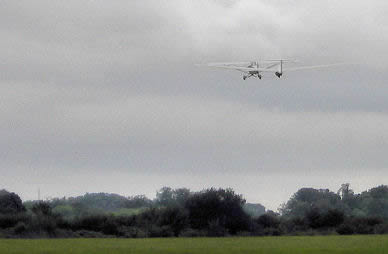 |
Inevitably this was in my mind one day, many years later, in California's Napa Valley. Ann, an ardent glider-pilot in England, was grumbling about our boring visits to local wine-growers when we happened on a small airfield with several parked gliders. She disappeared eagerly in the direction of the club-house. Minutes later she and a young man (looking to be still in his teens) emerged - she to install herself in a glider, he to hitch a towline to it then climb into an elderly plane (the 'tug'). As she later agreed, in England a lengthy safety-procedure would have ensued. Not now. As soon as the towline was taut the plane revved-up and my heart missed a beat as I realised they were taking-off downwind! The pair of them cleared the woodland at the edge of the field and rapidly climbed until they were a single dot in the distance. The tug soon returned, leaving me to sweat in the car, composing a painful message to Ann's parents reporting the demise of their wilful daughter. In due course she returned, made a perfect landing - and to this day recounts that flight with a wistful sparkle in her big eyes.
In Blog Nr 2 I described the risky "pointers-only" experiment which helped my production of "The Adventures of Richard Hannay" achieve a record audience. The business of "Audience Measurement" links that, the first big challenge of my broadcasting career, with the hugely ambitious (and much riskier) experiment I initiated at the other end of my 29 years with the BBC ... a story for another day.
D.H.M.
"My
father hated radio and could not wait for television to be invented
- so he could hate that too."
- - - - - -
Back to 'Contents' table
On to Blog 12
- - - - - -